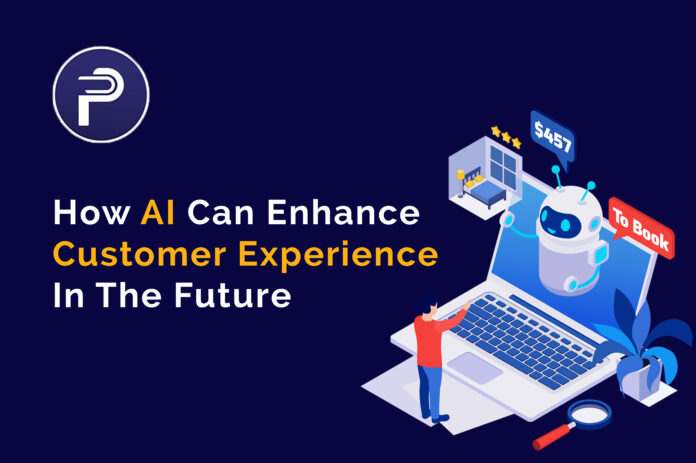Introduction
One technology trend that has gained significant attention in recent years is the evolution of artificial intelligence (AI). Its disruptive nature offers immense potential across various applications, particularly in transforming customer experience (CX).
Businesses increasingly recognize the importance of excellent customer experience for their success, prompting them to integrate AI to deliver intelligent, convenient, and informed customer experience throughout the customer journey. According to a prediction by IDC (International Data Corporation), by 2026, 60% of digital transformation initiatives will rely on cognitive computing or AI. Additionally, another study forecasts that by 2030, 95% of customer interactions will be managed without human involvement.
The immense potential of AI stems from its ability to analyze and process vast amounts of data from various sources, including human behaviors and emotions, which helps create more meaningful customer experiences.
We are already seeing AI’s impact across numerous industries. Examples like Tesla’s autonomous vehicles, Google’s personal assistant Siri, and Amazon’s Alexa/Echo illustrate how AI can transform every facet of our modern lives.
For businesses to successfully integrate AI into customer experience, they require three essential capabilities: data unification, real-time insights, and business interaction.
Here is how AI has improve customer experience for better

Enhanced customer experience with chatbots and AI-powered virtual assistants
Must Read:How To Select The Suitable Brand Name For Your Startup
AI can significantly enhance customer experience by making it automated, fast, and hassle-free. Chatbots, for instance, are AI-driven virtual tools designed for various customer engagement scenarios. They simulate human interactions and deliver immediate, personalized responses.
This technology effectively eliminates unnecessary delays and errors in customer service, particularly when addressing complaints. By automating responses to customer inquiries, companies can reduce training time for service representatives and save costs associated with repetitive queries.
Additionally, AI-powered virtual assistants enable businesses to distribute content more effectively across different channels, ensuring it reaches the right audience. For example, Facebook’s Messenger Bot assists shoppers in finding what they need through simple conversations. Combined with machine learning, AI can enhance client interactions and facilitate lead-generating marketing strategies to boost profitability. It can identify promising leads and ensure that potential customers are targeted on the appropriate platforms.
Predictive personalization
Predictive personalization involves the ability to anticipate user actions based on their past behaviors. Today, AI leverages predictive personalization to enhance customer experience by seamlessly integrating it into consumers’ daily lives. This AI-driven approach makes customers feel that every product or brand interaction is customized just for them.
Predictive personalization is especially valuable in online shopping, where data gathered from consumer behavior during online sessions is analyzed. This includes metrics such as time spent on sites, pages viewed, items purchased, forms completed, and searches conducted.
By analyzing this data, businesses can evaluate individual shopper needs, recommend suitable products, and facilitate home delivery. As a result, AI-enhanced processes will create smoother and more streamlined customer interactions across multiple channels.
AI-enabled analytics for crucial customer insights
AI can significantly enhance companies’ ability to generate actionable insights by integrating intelligence into CRM, marketing automation, and other essential operational tools. This technology helps improve customer engagement and empowers employees to make informed decisions.
Companies can utilize tools like facial recognition software, text analytics, and machine learning to understand customer perceptions, identify the right messaging, and communicate it in real-time. AI-driven customer journey analytics can analyze vast and complex datasets, uncovering numerous business opportunities.
Visual, voice and text engagements
Visual engagement, combined with voice and text sentiment analysis, enables companies to assess emotions and sentiments across various communications. AI-driven visual engagement technology analyzes facial expressions during in-person and video chat interactions.
This enhanced processing utilizes voice biometrics and the nuances of vocal tone and modulation during phone calls to understand emotions. With these AI algorithms, companies can effectively route communications and gauge customer satisfaction. This approach helps foster positive sentiments, ultimately enhancing customer lifetime value and driving repeat business for increased profitability.
Significant Change in decision making
The effectiveness of AI will be evaluated through practical metrics such as return on investment, new market opportunities, and diseases cured. These achievements will stem from a fundamental shift in decision-making.
The combination of big data, AI, and machine learning has established a new standard for decision-making metrics. It is increasingly recognized that decisions should not rely solely on intuition; they must be grounded in data. Whether it’s product reviews or customer service processes, AI empowers businesses to make informed choices. Sectors like healthcare, financial services, and automotive are experiencing a significant transformation in their decision-making strategies.
Recently, PwC, a leading audit and tax consulting firm, aggregated extensive data from the US Census Bureau, US financial data, and other publicly licensed sources to develop a comprehensive model for the financial decision-making of 320 million American consumers.
In the automotive industry, various AI applications have been created, spanning from vehicle design to marketing and sales decision support. AI modeling and simulation offer valuable insights into evolving consumer behavior, which is essential for making informed marketing decisions both in the short and long term.
Conclusion
Artificial Intelligence is here to stay, with endless future possibilities. Businesses recognize that AI-driven customer journey analytics will be essential for delivering impactful customer experiences quickly and efficiently.

